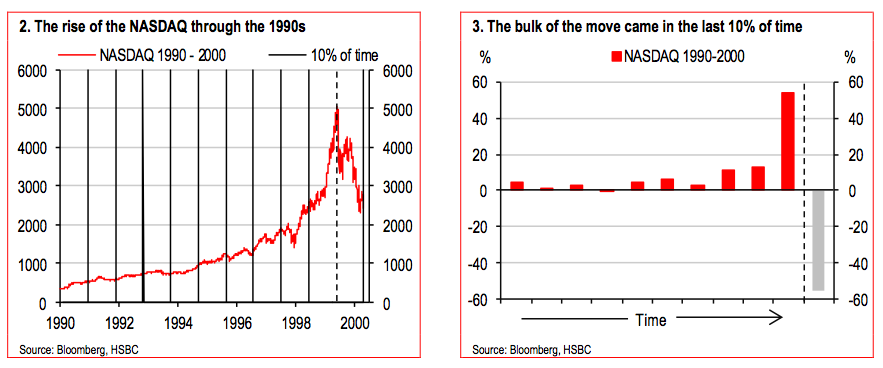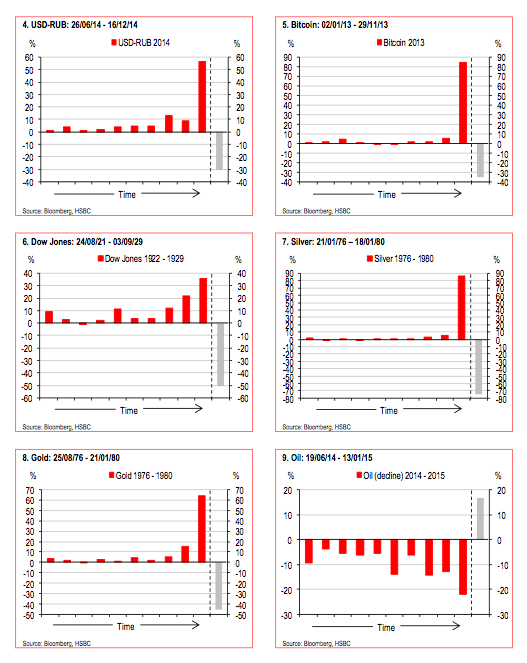笨狼發牢騷
發發牢騷,解解悶,消消愁
這是最近的數據(華爾街日報):

也許各國央行外匯儲存量跟匯率相關,隨著過去一年美元大幅增值而自動加料,也許大家覺得美元還是很重要,也許是歐洲央行大幅減息、采取量化寬鬆政策而導致歐元疲弱,無關緊要了,事實是美元需求還在那兒。
短期內,匯豐覺得美元到頂了,該大幅回調了(金融時報博文)。


美元的強勁,諸多影響:
彭博:The March Jobs Report Was a Wake-Up Call About the Impact of the Strong Dollar
參見:人民幣貶值的風險是什麽?

在美財長訪華一文裏說到,美財長以“人民幣尚未達到納入國際貨幣基金組織貨幣籃子的要求”一句話,輕輕把中國拒了。據說中國政府還真的想把人民幣納入國際貨幣基金組織貨幣籃子,看來這是下一步兩國較近的的焦點了。
【附錄】
華爾街日報:King Dollar Reaffirms Its Global Supremacy
Proportion of dollars in global foreign-exchange holdings has risen to its highest level in six years
The proportion of dollars in global foreign-exchange holdings has risen to its highest level in six years, cementing the greenback’s role in the center of the financial system.
Central banks held 62.9% of their reserves in dollars at the end of the fourth quarter, up from 62.3% in the third quarter and marking the highest level since 2009, according to data released Tuesday by the International Monetary Fund. The share held in euros fell to 22.2%, the lowest allocation in 13 years.
The figures show how central banks have ceased efforts to diversify their foreign-exchange reserves away from the dollar amid a plunge in the value of the euro. Because central banks with their large reserves wield unrivaled influence in currency markets, their shift back toward the dollar gives many investors confidence in the greenback’s rally.
In the first quarter, the dollar notched its biggest quarterly percentage gain against the euro since the inception of the common currency in 1999, up 13%. The greenback is trading at 12-year highs against the euro. Late Tuesday in New York, the euro bought $1.0735, compared with $1.0834 Monday.
“If you take a step back and look at the big picture, you see that the dollar is the only true reserve currency out there,” said Jens Nordvig, a managing director at Nomura.
Central banks piled into the euro in the years following its launch, causing some observers to question whether the euro could challenge the dollar’s status as the world’s top reserve currency. The euro’s share in global foreign-exchange reserves hit a peak of nearly 28% in the third quarter of 2009.
The currency lost some appeal in the years following the eurozone’s debt crisis in 2010, when some investors feared the monetary union could disintegrate. Worries about the eurozone’s fate diminished after the European Central Bank pledged to do whatever it takes to protect the union and the currency.
The ECB’s latest moves, however, have proved much more alarming to holders of euros.
The central bank lowered the interest rate on deposits held with it to below zero last June for the first time in history, as it tried to head off a recession. On March 9, the ECB began large-scale purchases of bonds, known as quantitative easing. By buying bonds, the central bank injects euros into the financial system, driving down both the currency’s value and yields on eurozone debt in hopes of fostering lending and spurring economic activity.
Some eurozone bonds are trading at negative yields, which means that investors pay for the privilege of lending money.
“For a while, it may have looked like the eurozone was a safe environment for reserve managers to move into,” said Robert Tipp, chief investment strategist at Prudential Fixed Income, which oversees some $500 billion in assets. But “the mix of negative interest rates and quantitative easing has been quite a potent one.”
With central banks seeking to reduce exposure to the euro’s negative interest rate, few markets offer the “breadth and depth to support the size of their investments besides the dollar,” Mr. Tipp said.
Some analysts cautioned that the latest data show the shift out of euros and into dollars occurring at a slower pace than in the previous quarter, indicating that further gains in the dollar may not be as sharp as they have been in past months. The holdings disclosed in the IMF report don’t include China, which holds the world’s largest currency reserves and doesn’t disclose the composition of its assets.
David Woo, head of global rates and currencies at Bank of America Merrill Lynch in New York, believes the euro’s decline is likely to moderate. He expects the euro to fall to one dollar before the end of this year but not much further.
Mr. Woo said if the euro trades below parity, “it would increase pressure on China to weaken the Chinese yuan,’’ which could lead to another currency war. Mr. Woo said a weaker euro and stronger dollar would put downward pressure on commodities prices and add to deflationary risks globally.
Still, others note that the momentum of central-bank dollar buying may be hard to stop, now that it has started.
Central banks don’t take decisions lightly, said Christopher Sullivan, who oversees $2.45 billion as chief investment officer at the United Nations Federal Credit Union in New York. “Reserve managers are put off by negative interest rates in the euroland. I think the trend of diversifying away from the euro will continue.”




